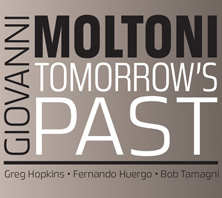 One
of the top jazz guitarists on the world stage, Boston-based Giovanni
Moltoni has a solid reputation for making great albums and his
best yet is the 2013 CD release of Tomorrow’s Past.
Moltoni has roots in Italy but he grew up in the US and his reputation
in and around the Berklee School Of Music is legendary. Now a professor
at Berklee, he recorded Tomorrow’s Past mid 2012 in studio
A at Berklee. On Tomorrow’s Past, Moltoni has chosen a
fine band with the rhythm section of Fernando Huergo (bass)
and Bob Tamagni (drums) given a unique sound thanks to the
inclusion of trumpeter Greg Hopkins, who’s tone is somewhat
similar to flugelhorn master Kenny Wheeler. Moltoni’s nimble,
fluid electric guitar sound accompanied by the stately horn sound
of Hopkins yields some impressive sonic results. Tomorrow's Past
is one of the great guitar-based instrumental jazz albums of 2013.
www.GiovanniMoltoni.com
One
of the top jazz guitarists on the world stage, Boston-based Giovanni
Moltoni has a solid reputation for making great albums and his
best yet is the 2013 CD release of Tomorrow’s Past.
Moltoni has roots in Italy but he grew up in the US and his reputation
in and around the Berklee School Of Music is legendary. Now a professor
at Berklee, he recorded Tomorrow’s Past mid 2012 in studio
A at Berklee. On Tomorrow’s Past, Moltoni has chosen a
fine band with the rhythm section of Fernando Huergo (bass)
and Bob Tamagni (drums) given a unique sound thanks to the
inclusion of trumpeter Greg Hopkins, who’s tone is somewhat
similar to flugelhorn master Kenny Wheeler. Moltoni’s nimble,
fluid electric guitar sound accompanied by the stately horn sound
of Hopkins yields some impressive sonic results. Tomorrow's Past
is one of the great guitar-based instrumental jazz albums of 2013.
www.GiovanniMoltoni.com
mwe3.com presents an interview with
GIOVANNI MOLTONI
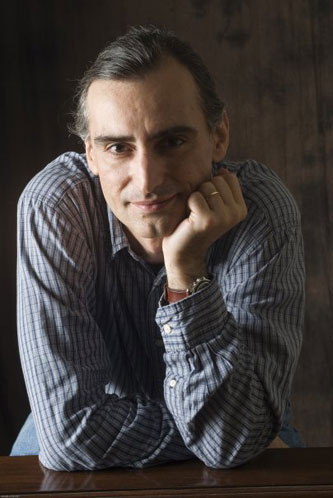 mwe3:
I remember writing about your excellent 2008 solo album 3, in
20th Century Guitar magazine, so I was happy to see and hear your
new 2013 solo album Tomorrow’s Past. Can you compare the
two studio albums, as well as your Live album from 2010, and
the lineups of musicians that appear with you on the new album. What’s
the musical chemistry like between you and the other players on the
new album and can you compare your approach to composing with that
of the other players who contribute their own compositions on the
Tomorrow’s Past CD?
mwe3:
I remember writing about your excellent 2008 solo album 3, in
20th Century Guitar magazine, so I was happy to see and hear your
new 2013 solo album Tomorrow’s Past. Can you compare the
two studio albums, as well as your Live album from 2010, and
the lineups of musicians that appear with you on the new album. What’s
the musical chemistry like between you and the other players on the
new album and can you compare your approach to composing with that
of the other players who contribute their own compositions on the
Tomorrow’s Past CD?
GIOVANNI MOLTONI: The two studio albums were similar in the
way they were recorded, but they were done in two different studios,
which sometimes can effect things. The kind of equipment, microphones
and preamps, of course can have an effect on the sound, but also the
space and how the musicians are set up can make a big difference.
My latest album included more compositions from the other band members,
so it felt a bit more like a common effort, even though I produced
the record.
The 2010 Live CD was not planned in advance, we happened to record
one on our concerts, and after listening to it, we decided to release
it. We felt that it had great energy and that it was a good example
of how we sound when we play live (and when we don't know we are recording
a CD). The line up of the musicians has been the same for all 3 albums,
we have been playing together in this formation for many years and
this last CD was a kind of celebration of that.
My approach to composing is based on the idea that music should be
interesting as well as pleasant to listen to. There is a great variety
of different time signatures, modulations and tonal/modal musical
landscapes in this recording, and that creates interesting and inviting
musical canvases. I worked very hard on achieving that balance in
this album, and I hope we succeeded.
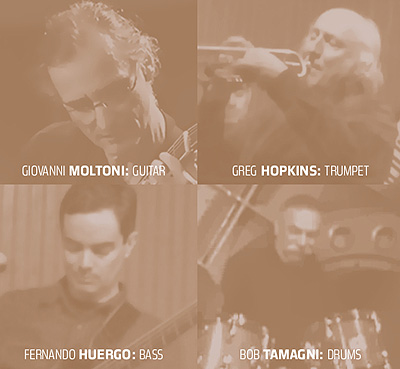 mwe3:
Can you say something about the guitars you used to record the Tomorrow’s
Past album and what amps strings, synths and effects you feature
on the new album? How about other recent guitar acquisitions and what
interests you about the guitar world of 2013?
mwe3:
Can you say something about the guitars you used to record the Tomorrow’s
Past album and what amps strings, synths and effects you feature
on the new album? How about other recent guitar acquisitions and what
interests you about the guitar world of 2013?
GIOVANNI MOLTONI: For this CD, I used my Gibson ES339, the
strings are D'addario's EXL115. I use this guitar most of the time,
unless I need an acoustic one. I really enjoy my 339, it sounds good
and it's a pleasure to play.
My set up involves a Windows 7 laptop with Sonar X2, Avid Mbox (3rd
Gen), and a soundclone Jazzamp. The guitar plugs into the mbox and
all the effects are processed by the computer, normally through Sonar
as the DAW host, if I'm using a Mac it would be Live, or Logic, I
have used several different configurations, this just happens to be
my latest one. The guitar sounds normally involve an amp simulator,
chorus, rev. or whatever is needed for the specific tune we are playing.
This CD was mainly an acoustic CD, so the guitar sound doesn't change
very much throughout the recording.
I am fascinated by the use of technology in combination with my guitar,
and I consider that to be one of the most exiting developments of
the past few years. Aside from more recordings with my quartet, I
am playing with the idea of working on a solo guitar album, in the
near future, where I can explore all of those interactions between
acoustic/electric guitar sound and background synths. I already explored
some of this in my 2008 CD titled 3. For the solo guitar album
it would be more orchestrated and full.
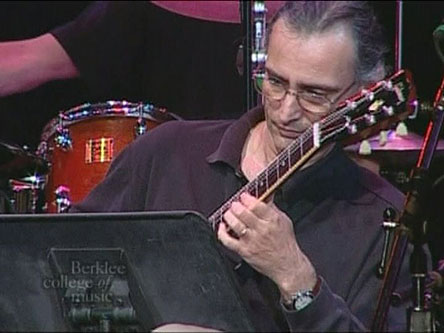 mwe3:
You recorded Tomorrow’s Past at the Berklee College Of
Music in Boston? The CD sounds great by the way. Can you say something
about the way the Tomorrow’s Past album was recorded?
Was it done live, were there overdubs? What was it like working with
engineer Tarik Mahrour and sound man Bob Patton? Describe the recording
process of Tomorrow’s Past and somethings you like and
enjoy about the sound of Studio A at Berklee.
mwe3:
You recorded Tomorrow’s Past at the Berklee College Of
Music in Boston? The CD sounds great by the way. Can you say something
about the way the Tomorrow’s Past album was recorded?
Was it done live, were there overdubs? What was it like working with
engineer Tarik Mahrour and sound man Bob Patton? Describe the recording
process of Tomorrow’s Past and somethings you like and
enjoy about the sound of Studio A at Berklee.
GIOVANNI MOLTONI: Thank you very much. We had 2 days available
in Studio A at Berklee for the recording, and we decided to use the
time to complete the tracking, and mix the record at a later time.
All the music was played live, as we normally do, and then we did
some edits, depending how happy we were with the track. Our experience
at Berklee was good, Studio A is spacious and comfortable, Tarik did
a good job with the sound and we managed to finish the tracking for
all the music by the end. Once the recording was finished, I brought
back home all the takes and started working on the guitar sounds.
In a multitrack studio situation, I normally record one “clean
or direct” guitar sound, as well as the sound from my amp, which
has all the effects on it. To prepare the music for the final mix,
I sometimes re-amp, or apply effects to the guitar, once everything
was ready I got together with Bob to finish the final mix. Everything
worked out well and I am thankful to all the people involved for they
contribution to this recording.
mwe3: Are you still teaching music and what are your roles
at Berklee School Of Music? You’ve been there for some years
now. What’s the guitar curriculum at Berklee like these days
and how is the school doing these days? Has it changed much over the
past 40 years?
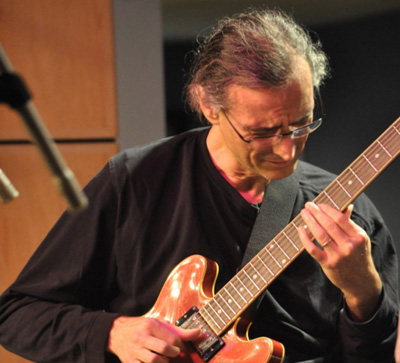 GIOVANNI
MOLTONI: I have been a faculty member at Berklee for 15 years.
I am a professor in the Ear Training Department. Berklee is an exiting
and vibrant place and I have being very happy there. I've met many
great musicians that over the years have become some of my dearest
friends, and we've made a lot of music together.
GIOVANNI
MOLTONI: I have been a faculty member at Berklee for 15 years.
I am a professor in the Ear Training Department. Berklee is an exiting
and vibrant place and I have being very happy there. I've met many
great musicians that over the years have become some of my dearest
friends, and we've made a lot of music together.
The guitar curriculum at Berklee has changed to adjust with the times
over the last 40 years and it covers most of the needs that our students
might have, from simple song writing oriented labs to advanced improvisation
and harmonic concepts.
mwe3: It feels like Tomorrow’s Past has a timeless
kind of jazzy sound. How would you describe your sound to that of
other guitarists playing today and how influenced were you by those
players who were also making musical breakthroughs back in the 1970s,
the decade which might have been the greatest era for instrumental
jazz guitar fusion music?
GIOVANNI MOLTONI: To describe my sound is a very difficult
question for me, I normally look for specific things and try to adjust
the equipment to create that vibe or tone. I love the medium/high
register of the guitar but only when the sound is warm and round,
if it gets too trebly or squeaky it becomes completely uninspiring
for me. I also look for a sound that is balanced across the strings,
so that the sound is warm but there is not too much middle/low sticking
out in the mix, the balance between those two aspects of the guitar
sound is very important to me. In regard of saturation, (tube sound)
or distortion, I like a longer singing voice for some of my solos,
and I try to achieve that by adjusting the saturation of the signal
in a way that allows for that without creating problems when I play
chords, I like just a little saturation, so that the guitar acquires
that singing sound, but I don't like it when that effects how successfully
I can play the chords, harmonies are very important to me and my music.
Again, it's all in the balance.
One way or another I have being inspired by very many guitar players,
not only famous ones but also the many that I worked with through
the years, and I thank all of them for it.
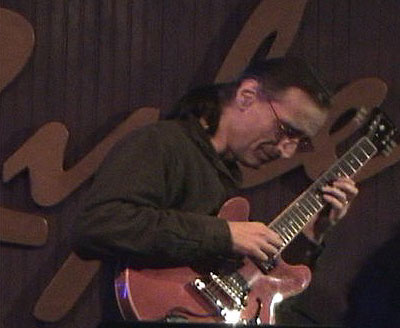 mwe3:
Where do see the instrumental guitar fusion sound going these days?
Do you think there’s more of a desire to return to the roots
and which guitarists today most impress you, both from a technical
standpoint and a compositional perspective and how about other musicians
who aren’t guitarists but who impress you with their own music?
mwe3:
Where do see the instrumental guitar fusion sound going these days?
Do you think there’s more of a desire to return to the roots
and which guitarists today most impress you, both from a technical
standpoint and a compositional perspective and how about other musicians
who aren’t guitarists but who impress you with their own music?
GIOVANNI MOLTONI: I always find that there are different trends
going at the same time, but I wouldn't be able to tell you if I see
one direction going stronger than any others. I really like the idea
of Metheny's Orchestration CD, and I really admire many other
guitar players for their technique or compositional skills. The ones
that I prefer are the ones that combine technical skills with compositional
skills to present new and refreshing music.
mwe3: What are your plans for Tomorrow’s Past and
how about other plans for writing, recording and performing your music?
Also what are you hoping listeners and other musicians will come away
with after hearing the Tomorrow’s Past album?
GIOVANNI MOLTONI: I hope that Tomorrow's Past will reach
many people, and that folks will enjoy listening to it. My intention
was to create something pleasant and meaningful, where my technique
and musicianship would be in service of beautiful music. I try to
perform as much as possible, and, once I  recover
from the release of this CD, I'm hoping that I can find the inspiration
necessary to start writing down some new music again. It can be difficult
to plan when exactly a new CD will happen, although I already shared
with you some of my future plans. I could compare my musical journey
and the CDs that have been created so far to a garden. Each album
represents a plant or a bunch of flowers in a certain section of the
garden plot – each is unique, each contributing to the overall
landscape of who I am musically. As most gardeners know, keeping a
garden can be difficult – the upkeep can be tiring and messy,
but at the same time, it's wonderful to be nurturing something, and
to see results of your hard work. Making music is an organic process,
and it's something that needs to be nurtured and allowed to grow when
it's ready. In this moment, I am happy to say that I'm very excited
about Tomorrow's Past – it's milestone for me and is a
great illustration of where I am musically, and it's also a real culmination
of the years that my band and I have performed together.
recover
from the release of this CD, I'm hoping that I can find the inspiration
necessary to start writing down some new music again. It can be difficult
to plan when exactly a new CD will happen, although I already shared
with you some of my future plans. I could compare my musical journey
and the CDs that have been created so far to a garden. Each album
represents a plant or a bunch of flowers in a certain section of the
garden plot – each is unique, each contributing to the overall
landscape of who I am musically. As most gardeners know, keeping a
garden can be difficult – the upkeep can be tiring and messy,
but at the same time, it's wonderful to be nurturing something, and
to see results of your hard work. Making music is an organic process,
and it's something that needs to be nurtured and allowed to grow when
it's ready. In this moment, I am happy to say that I'm very excited
about Tomorrow's Past – it's milestone for me and is a
great illustration of where I am musically, and it's also a real culmination
of the years that my band and I have performed together.
Thanks to Giovanni Moltoni @ www.GiovanniMoltoni.com



